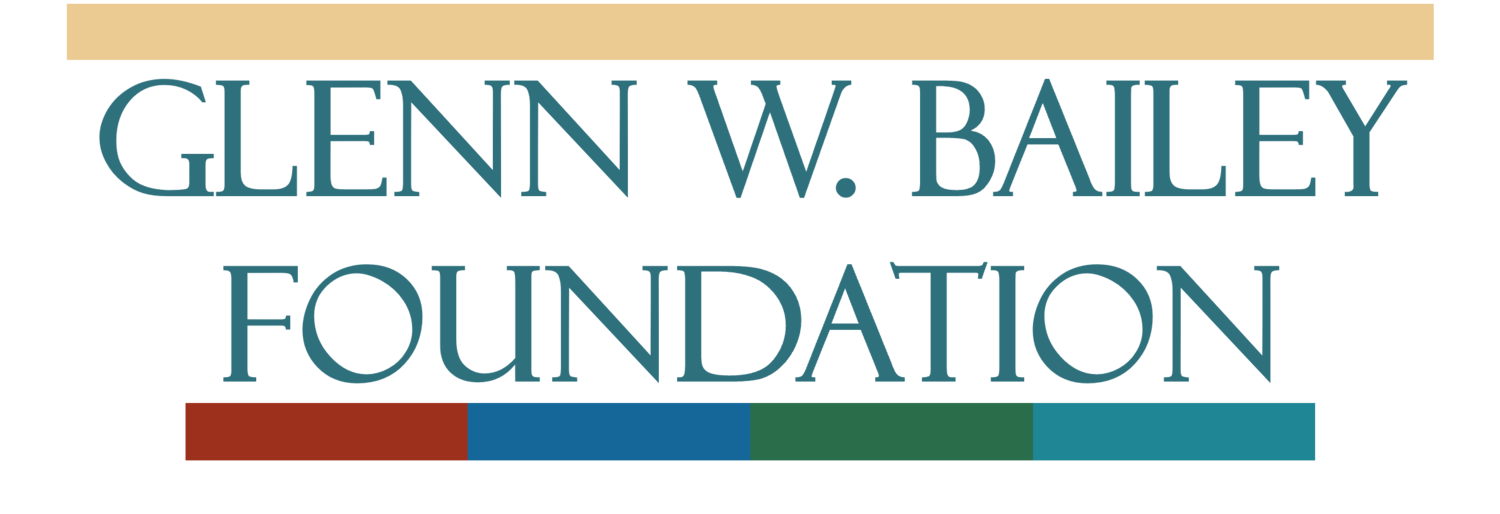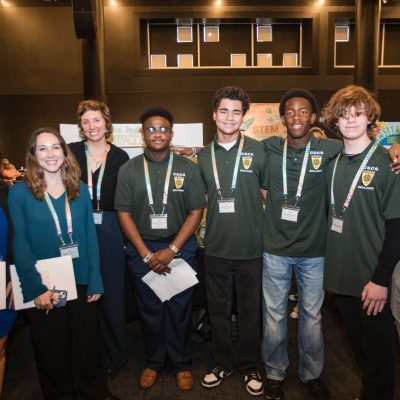Calling all middle and high school teachers and students! Get engaged in STEM through our engineering design-based program, STEM Challenge. The STEM Challenge culminates in an Expo at the museum, where students present their work to content expert judges. Winning students will win scholarships to Florida public universities.
Online registration for the 2025-2026 STEM Challenge is now closed. Please contact mteuber@frostscience.org if you are interested in participating.
2025-2026 STEM Challenge
Innovating with Technology to Advance Science

Technology has become an increasingly prevalent part of everyday life. This year’s STEM Challenge theme prompts students to think about how emerging technologies can be used to advance science. As students think about the numerous uses of technology, they are encouraged to use emerging technologies to develop and model their solutions.
Emerging technologies in the context of the STEM Challenge can be defined as any technology that is currently in development, gaining new features, or being used in new ways. Students may use emerging technologies within their solutions or may begin developing their own emerging technology as part of the STEM Challenge.
- 3-Dimensional Modeling and Printing
- Artificial Intelligence
- Biotechnology
- Immersive Technologies
- Implantables
- Nanotechnology
- Robotics
- Wearables
2025-2026 STEM Challenge Prompts:
Paleontology: Many fossils are located in hard-to-reach or remote environments and are only accessible seasonally. Design a solution that uses emerging technologies to find, access, extract, or preserve fossils more efficiently in extreme environments.
Marine Science: Many agencies use technology to monitor and regulate marine activities. Design a solution that uses emerging technology to monitor or respond to human-led or naturally occurring marine activity.
Health: Emerging technologies are being used to help recognize patterns in health data and diagnose and treat patients. However, these technologies are difficult to access and can be expensive or prone to errors. Design or improve upon a technology that accurately interprets health related data or makes healthcare more accessible and efficient.
Astronomy: As we continue to explore our universe, we need technology capable of supporting and entertaining astronauts in space and on other planets. Design a product or solution that uses emerging technology to fill at least one basic need for an astronaut in space.
- May 2025: Registration opens
- September 23, 2025: Professional learning for participating teachers
- Fall 2025-Spring 2026: Classroom-based project work
- April 18, 2026: STEM Challenge Expo at Frost Science
- Computer Science
- Environmental Science
- STEM Research Elective
- AP Biology
- Marine Science
- Ecology
- Health Science
- Earth and Space Science Honors
Participating teachers will:
- Attend a professional learning workshop in summer or fall 2025.
- Use the resources provided to guide their students through the STEM Challenge.
- Facilitate the STEM Challenge throughout the school year.
- Submit at least one student project as part of the STEM Challenge.
- Receive a $500 stipend to purchase materials for student projects.
Participating students will:
- Choose a track and question to answer.
- Work in small groups or individually to complete the challenge.
- Have teachers submit their projects to the STEM Challenge for judging.
- If invited to the STEM Challenge Expo, present their work to judges at Frost Science.
- First, second and third place winners, top oral presentations and top models will receive a college scholarship.
Receive your M-DCPS STE(A)M Designation through participation in this challenge with the following engagements:
- Professional Learning Experiences on either September 23, 2025.
- Free field trip and Learning Lab for 30 students to Frost Science.
- Free outreach to your classroom.
- Virtual Meet the Museum Scientist opportunity.
- Participation in the STEM Challenge Expo with students.
Students may engage with resources as part of STEM Challenge activities or to continue learning after they have completed the STEM Challenge.
STEM Challenge Resources – Activity 2: Sound Sources
STEM Challenge Resources – Activity 4: Pitch Your Point
Free Resources
- Phillip and Patricia Frost Museum of Science: Frost Science will print 3D models for students participating in the STEM Challenge. These models will be printed on a small scale and model files must be sent to Frost Science 2 months prior to the necessary in-hand date. If you are interested in printing your STEM Challenge models for free, please send your STL files to education@frostscience.org
- AutoDesk: The AutoDesk Suite provides a wide variety of different software that range from simple 3D modeling to infrastructure design. Software provided in the AutoDesk suite are free for students with a valid school email-address.
- Tinkercad (Beginner): Tinkercad is a web-based AutoDesk software that allows users to create 3D models, circuits, and code. The circuits are compatible with Arduino and Micro:Bit and utilize block and Python coding. Tinkercad cannot be used to design circuits compatible with Raspberry Pi. Tinkercad is considered an easy-to-use software.
- Blender (Advanced): Blender is a 3D creation suite that has more capabilities than other 3D modeling software, like Tinkercad, and can create styled and photo-realistic 3D models, animations, simulations, and more. Because Blender has a lot of tools and settings, it also has a steep learning curve.
- GitHub (Intermediate-Advanced): GitHub is a platform where developers can create, store, manage, and share their code with other users. Like with any online download, code used for the STEM Challenge should only come from reliable sources to avoid encountering malware. The source for any code from GitHub used in a STEM Challenge project should be cited.
- Google Earth Studio (Beginner-Intermediate): Google Earth Studio is an online software that can be used to create animations and Virtual Reality scenes. Google Earth Studio utilizes Google Earth satellite and Street View imagery along with 3D building models.
- KIRI Engine (Beginner): KIRI Engine allows users to scan objects using their phone to create 3D models. The 3D models generated by KIRI Engine can then be exported and imported into other 3D modeling software, where the file can be edited.
- QGIS (Intermediate-Advanced): QGIS is a geographic information system (GIS) software. As a GIS software, QGIS allows users to analyze, display, and map location data. Uses for GIS maps include displaying weather data, identifying flood zones, monitoring deforestation, and urban planning.
- Teachable Machine (Beginner): Teachable Machine is a machine learning AI program. Users provide images and sounds to the Teachable Machine, and the AI will learn how to identify and categorize the provided media. The Teachable Machine can be exported and used in conjunction with coding.
- Unreal Engine (Advanced): Unreal Engine is a 3D graphics computer game engine. While this software is primarily used to create video games, it is also used to create simulations, VR/AR/MR, video, and more. Knowing C++ is advantageous when using the program.
- Visual Studio Code (VSCode) (Intermediate-Advanced): VSCode is an environment where users can write, debug, test, and compile code. VSCode requires a basic understanding of at least one programming language.
- Online Courses (Beginner-Advanced): Students can take free and paid courses that address a wide range of different topics, including coding, artificial intelligence, machine learning, and more.
STEM Challenge teachers can also reserve their Field Trip and the Meet the Museum Scientist opportunities by completing the Optional and Additional Engagements Form.
- For the 2025-2026 school year, students participating in the Junior STEM Challenge will complete the same project as high school students. In the future, Frost Science will modify this challenge to better fit a middle school audience. The Junior STEM Challenge aims to prepare students for the STEM Challenge in their high school years, serving as meaningful practice to hone their skills.
- Middle school teachers participating in the Junior STEM Challenge will receive the same guidebook with activities and additional resources as high school teachers. Teachers will be responsible for adapting these resources for their students.
- We cannot guarantee a stipend for teachers participating in the Junior STEM Challenge, as the program is being extended to serve this audience on request. Whether the stipend is offered to middle school teachers depends on the number of high school registrations for the STEM Challenge and will be communicated once the registration process is complete.
- Students participating in the Junior STEM Challenge will be judged separately from the STEM Challenge. Winning students will receive different prizes from their high school counterparts.
- To participate in the Junior STEM Challenge, all students must complete their project as part of a group. The Junior STEM Challenge will only accept individual applicants on special request and they will be judged with their group counterparts.
- To register for the Junior STEM Challenge, fill out the registration form.
Submitted student projects will be judged virtually and in-person during a two-round judging process. These judges will help determine which students earn scholarships through the program.
Round 1: Virtual Judging
Student projects will be submitted digitally by their teachers before the first round of judging. Judges participating in round one will attend a 1-hour virtual training session before being divided into groups. Each group will review a portion of the STEM Challenge project submissions. Round 1 judges will meet with their assigned group to discuss which students will be moving on to round 2 of judging at the museum on April 18, 2026. Virtual judges will receive four guest passes to Frost Science for their participation.
Round 2: In-person Judging at the STEM Challenge Expo (April 18, 2026)
The second round of judging will occur at the STEM Challenge Expo. During this round of judging, groups of judges will review student projects and presentations in-person. Judges will then deliberate and determine the STEM Challenge winners. In-person judges will receive free parking, four passes to Frost Science, and complementary refreshments and lunch during the event.
Judge Requirements
Judges must have at least a bachelor’s degree and are encouraged to have experience in education, any STEM discipline, or, ideally, experience in one of the four disciplines of the STEM Challenge: astronomy, paleontology, marine science, or health.
Applying to be a Judge
If you are interested in becoming a judge for the STEM Challenge, fill out the judging application here.
STEM Challenge projects will be evaluated in a rigorous two-stage judging process. While the first round of judging will occur virtually, the second round of judging will be held in-person at Frost Science. Winners of the STEM Challenge will receive college scholarships through Florida Prepaid. The scholarship amounts are as follows:
Individual Project Winners
- 1st Place: 4-year Florida University Plan
- 2nd Place: 3-year Florida University Plan
- 3rd Place: 2-year Florida University Plan
- Top Oral Presentation: 1-year Florida University Plan
- Top Model: 1-year Florida University Plan
Group Project Winners
- 1st Place: 3-year Florida University Plan
- 2nd Place: 2-year Florida University Plan
- 3rd Place: 2-year Florida University P
- Top Oral Presentation: 1-year Florida University Plan
- Top Model: 1-year Florida University Plan
Junior STEM Challenge Project Winners
- 1st Place: 1-year Florida University Plan
- 2nd Place: 1-year Florida University Plan
- 3rd Place: 1-year Florida University Plan
For winners to receive college scholarships through Florida Prepaid, they must have a valid Social Security Number, be less than 21 years of age, not have graduated high school, be a FL resident for 1+ year, and be a US citizen. If the winning student does not meet one of these criteria, Frost Science will work directly with the student to distribute the scholarship. Scholarships not distributed through Florida Prepaid will not qualify for the matched scholarship value and will be of lesser value.
Florida University Plans distributed through Florida Prepaid are designed to be used at public Florida state universities but may be applied to tuition at private and out-of-state schools. When these scholarships are applied to private and out-of-state schools, their monetary value will be applied to student tuition and will not cover the 1-to-4-year value that they would at a Florida state university.
STEM Challenge Events
April 18, 2026 at 10:00 AM
STEM Challenge Expo
Phillip and Patricia Frost Museum of Science
Get Ready for the STEM Challenge!


